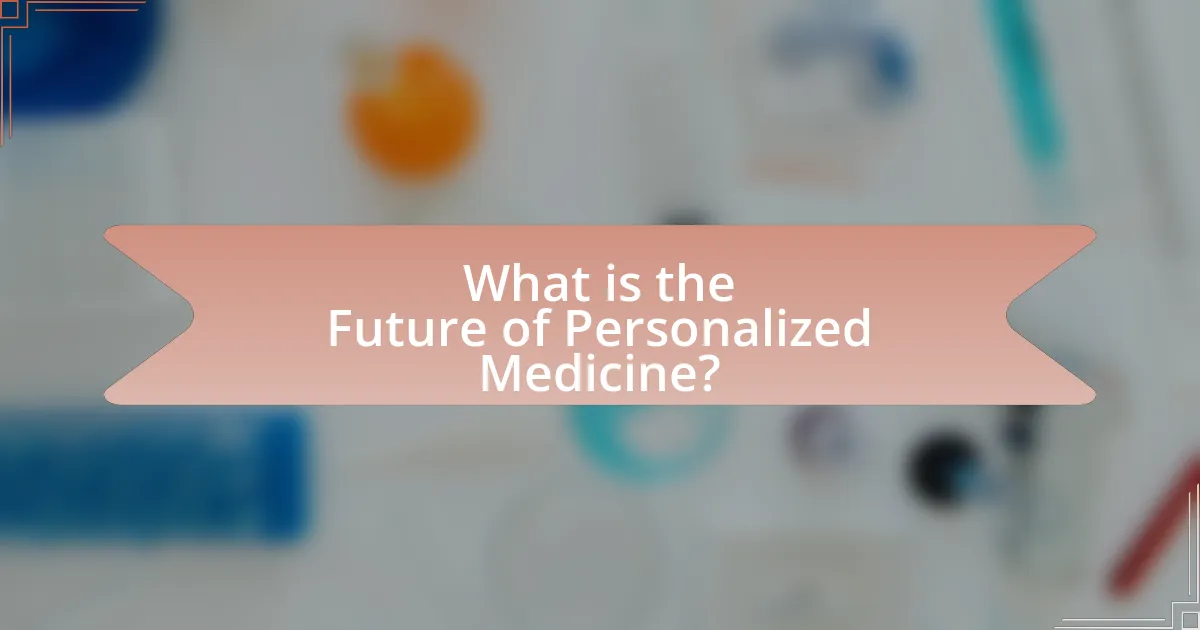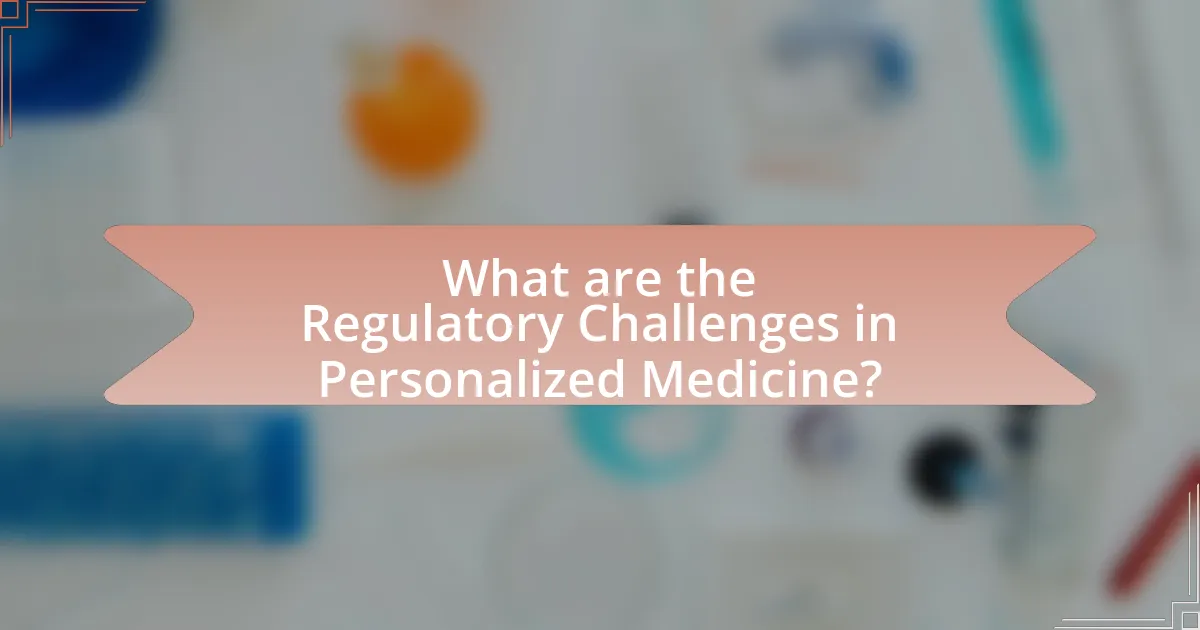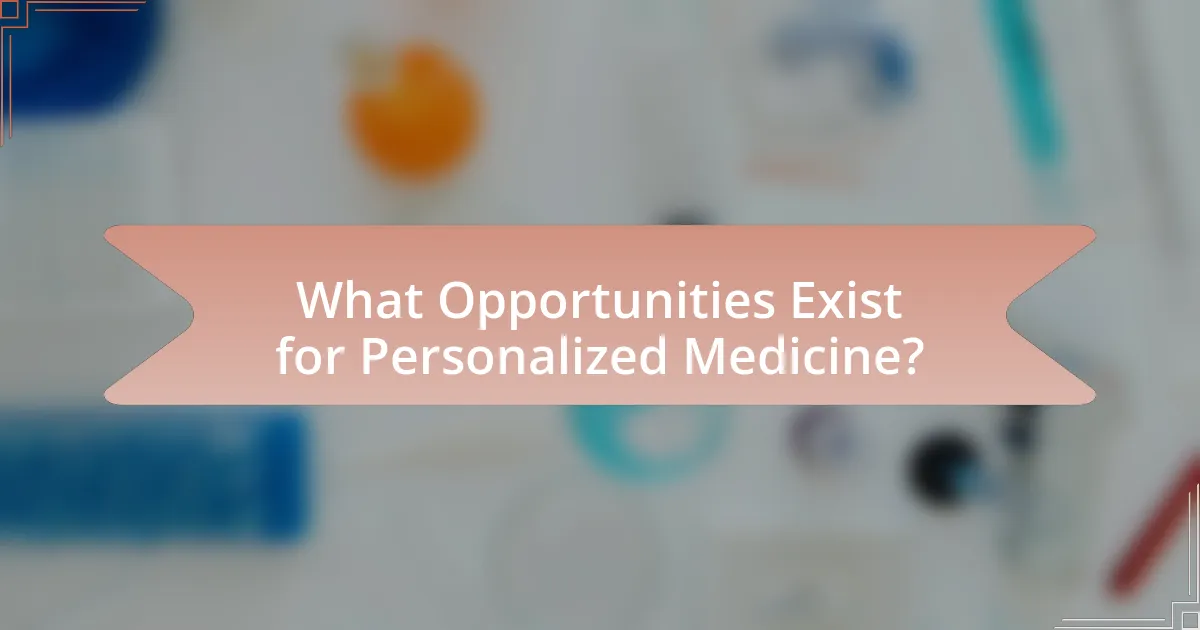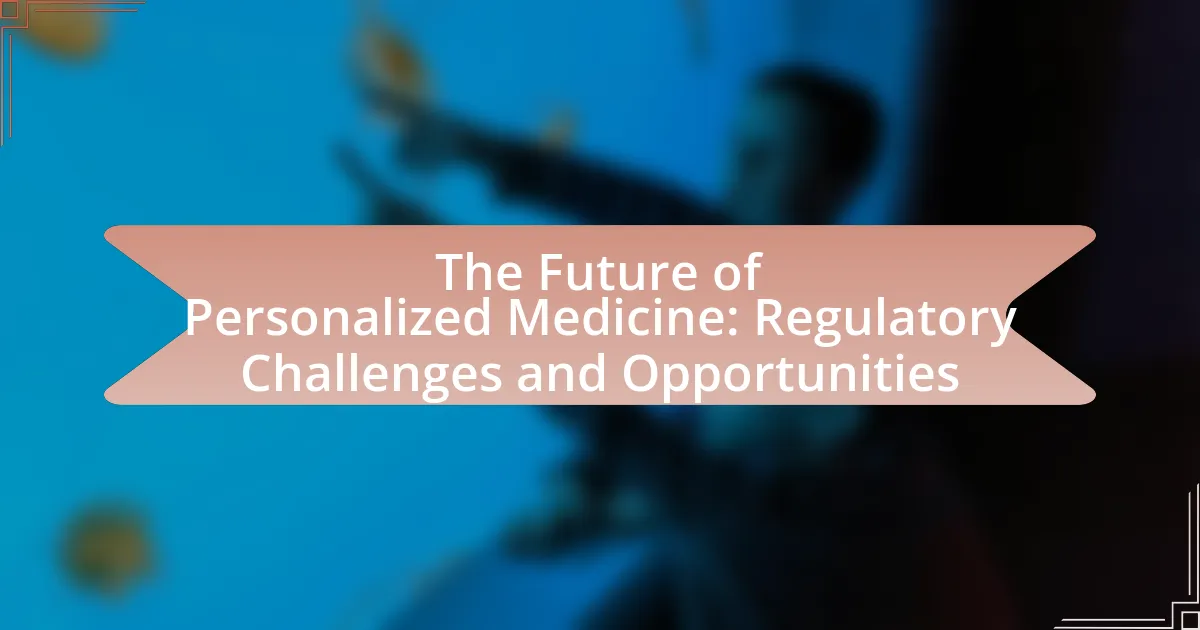The article focuses on the future of personalized medicine, emphasizing the advancements in genomics, data analytics, and technology integration that are shaping tailored healthcare solutions. It explores the definition of personalized medicine, its key characteristics, and how it differs from traditional medicine, highlighting trends such as genomic sequencing and artificial intelligence that enhance treatment efficacy. Additionally, the article addresses regulatory challenges, including approval processes and data privacy concerns, while outlining the opportunities for collaboration among stakeholders to drive innovation and improve patient outcomes. The potential economic advantages and best practices for implementing personalized medicine strategies are also discussed, providing a comprehensive overview of the evolving landscape in this field.

What is the Future of Personalized Medicine?
The future of personalized medicine is characterized by advancements in genomics, data analytics, and technology integration, leading to more tailored healthcare solutions. As precision medicine evolves, it will increasingly utilize genetic information to customize treatment plans, improving patient outcomes and reducing adverse effects. For instance, the National Institutes of Health (NIH) has reported that genomic data can enhance the efficacy of therapies for conditions like cancer, where targeted treatments based on genetic profiles have shown significant success. Furthermore, regulatory frameworks are adapting to these innovations, with agencies like the FDA developing guidelines to ensure the safe and effective implementation of personalized therapies. This evolution signifies a shift towards a more individualized approach in medicine, addressing both the unique genetic makeup of patients and the complexities of their health conditions.
How is personalized medicine defined in the context of healthcare?
Personalized medicine in healthcare is defined as a medical model that tailors treatment and prevention strategies to individual characteristics, including genetics, environment, and lifestyle. This approach enhances the effectiveness of therapies by considering the unique biological makeup of each patient, which can lead to improved outcomes and reduced adverse effects. Evidence supporting this definition includes the use of genomic data to guide cancer treatments, where targeted therapies have shown significantly higher success rates compared to traditional methods.
What are the key characteristics of personalized medicine?
Personalized medicine is characterized by its focus on tailoring medical treatment to the individual characteristics of each patient. This approach utilizes genetic, environmental, and lifestyle factors to optimize therapeutic strategies, leading to more effective and targeted interventions. For instance, the use of genomic sequencing allows for the identification of specific mutations in cancer patients, enabling oncologists to select targeted therapies that are more likely to be effective based on the patient’s unique genetic profile. Additionally, personalized medicine emphasizes the importance of patient engagement and shared decision-making, ensuring that treatment plans align with the patient’s preferences and values. This shift towards individualized care has been supported by advancements in biotechnology and data analytics, which facilitate the integration of diverse health data into clinical practice.
How does personalized medicine differ from traditional medicine?
Personalized medicine differs from traditional medicine by tailoring medical treatment to the individual characteristics of each patient, rather than using a one-size-fits-all approach. Traditional medicine typically relies on standardized protocols based on population averages, while personalized medicine utilizes genetic, environmental, and lifestyle factors to optimize treatment efficacy. For example, targeted therapies in cancer treatment are designed based on specific genetic mutations present in a patient’s tumor, leading to more effective outcomes compared to conventional treatments that may not consider these individual differences. This shift towards personalization is supported by advancements in genomics and biotechnology, which enable healthcare providers to make more informed decisions based on a patient’s unique profile.
What trends are shaping the future of personalized medicine?
Key trends shaping the future of personalized medicine include advancements in genomics, the integration of artificial intelligence, and the emphasis on patient-centered care. Genomic sequencing technologies, such as next-generation sequencing, have significantly reduced costs and time, enabling tailored treatments based on individual genetic profiles. Artificial intelligence is enhancing data analysis, allowing for more accurate predictions of treatment responses and disease progression. Additionally, the focus on patient-centered care is driving the development of therapies that consider individual preferences and lifestyles, leading to improved adherence and outcomes. These trends are supported by the increasing availability of large-scale genomic databases and the growing collaboration between technology companies and healthcare providers, which facilitate the implementation of personalized approaches in clinical practice.
How is technology influencing personalized medicine?
Technology is significantly influencing personalized medicine by enabling the analysis of genetic, environmental, and lifestyle factors to tailor treatments to individual patients. Advances in genomic sequencing, such as next-generation sequencing, allow for rapid and cost-effective analysis of a patient’s DNA, identifying specific mutations that can inform targeted therapies. For instance, the use of CRISPR technology has revolutionized gene editing, providing potential cures for genetic disorders by directly modifying the genes responsible for these conditions. Furthermore, data analytics and artificial intelligence are enhancing the ability to interpret complex biological data, leading to more precise predictions of treatment responses. According to a report by the National Institutes of Health, personalized medicine can improve patient outcomes by ensuring that therapies are more effective and have fewer side effects, thereby optimizing healthcare resources.
What role do genetic advancements play in personalized medicine?
Genetic advancements are crucial in personalized medicine as they enable tailored treatment strategies based on an individual’s genetic profile. These advancements allow for the identification of specific genetic mutations associated with diseases, leading to targeted therapies that improve treatment efficacy and minimize adverse effects. For instance, the development of targeted therapies for cancers, such as trastuzumab for HER2-positive breast cancer, demonstrates how genetic insights can guide treatment decisions. Additionally, advancements in genomic sequencing technologies, such as next-generation sequencing, have significantly reduced costs and time for genetic testing, facilitating broader access to personalized medicine. This integration of genetic information into clinical practice enhances the precision of medical interventions, ultimately improving patient outcomes.
What are the potential benefits of personalized medicine?
Personalized medicine offers the potential benefits of improved treatment efficacy, reduced adverse effects, and enhanced patient engagement. By tailoring medical treatment to the individual characteristics of each patient, such as their genetic makeup, healthcare providers can select therapies that are more likely to be effective for specific conditions. For instance, studies have shown that targeted therapies in oncology can lead to better outcomes, with some patients experiencing up to a 50% increase in survival rates when treated with personalized approaches. Additionally, personalized medicine can minimize the risk of side effects by avoiding ineffective treatments that may cause harm, thus improving overall patient safety. Furthermore, when patients are involved in their treatment decisions based on personalized data, they tend to be more engaged and compliant, leading to better health outcomes.
How can personalized medicine improve patient outcomes?
Personalized medicine can improve patient outcomes by tailoring treatments based on individual genetic, environmental, and lifestyle factors. This approach allows healthcare providers to select therapies that are more effective for specific patient profiles, thereby increasing the likelihood of successful treatment. For instance, studies have shown that targeted therapies in oncology, such as those based on genetic mutations, can lead to higher response rates and improved survival compared to traditional one-size-fits-all treatments. According to a report by the National Institutes of Health, personalized medicine has the potential to reduce adverse drug reactions and enhance the efficacy of treatments, ultimately leading to better health outcomes for patients.
What economic advantages does personalized medicine offer?
Personalized medicine offers significant economic advantages by reducing healthcare costs through targeted therapies and improving patient outcomes. By tailoring treatments to individual genetic profiles, personalized medicine minimizes the trial-and-error approach often associated with traditional treatments, leading to faster recovery times and fewer adverse drug reactions. For instance, a study published in the Journal of Personalized Medicine found that targeted therapies can reduce overall treatment costs by up to 30% due to decreased hospitalizations and more effective management of chronic diseases. Additionally, personalized medicine enhances the efficiency of drug development, as evidenced by the FDA’s approval of targeted therapies that can reach the market more quickly, ultimately lowering research and development expenses.

What are the Regulatory Challenges in Personalized Medicine?
Regulatory challenges in personalized medicine include issues related to the approval process, data privacy, and the need for tailored guidelines. The approval process for personalized therapies often lacks clear pathways, as traditional regulatory frameworks are not designed to accommodate the unique characteristics of these treatments. For instance, the U.S. Food and Drug Administration (FDA) has been working to adapt its regulatory framework, but inconsistencies remain, leading to delays in bringing innovative therapies to market. Additionally, data privacy concerns arise from the extensive use of genetic and health data, necessitating robust protections to ensure patient confidentiality. Furthermore, the lack of standardized guidelines for biomarker validation complicates the regulatory landscape, as different stakeholders may interpret data differently, impacting the consistency of approvals. These challenges highlight the need for a more adaptive regulatory environment that can keep pace with advancements in personalized medicine.
What regulatory frameworks currently govern personalized medicine?
The regulatory frameworks currently governing personalized medicine include the Food and Drug Administration (FDA) regulations in the United States, the European Medicines Agency (EMA) guidelines in Europe, and various national health authorities worldwide. The FDA oversees the approval of personalized therapies, ensuring they meet safety and efficacy standards, while the EMA provides similar oversight in Europe, focusing on the evaluation of medicinal products. Additionally, the Clinical Laboratory Improvement Amendments (CLIA) regulate laboratory testing, which is crucial for personalized medicine diagnostics. These frameworks are essential for ensuring that personalized medicine products are safe, effective, and accessible to patients, reflecting the growing importance of tailored therapies in modern healthcare.
How do these regulations impact the development of personalized therapies?
Regulations significantly impact the development of personalized therapies by establishing safety and efficacy standards that must be met before therapies can be approved for clinical use. These regulations ensure that personalized therapies, which often involve genetic or biomarker-based approaches, undergo rigorous testing to validate their effectiveness for specific patient populations. For instance, the FDA’s guidance on the use of biomarkers in drug development emphasizes the need for clear evidence linking biomarkers to clinical outcomes, which can streamline the approval process for targeted therapies. This regulatory framework can both facilitate innovation by providing clear pathways for approval and create challenges by requiring extensive data collection and validation, potentially delaying the introduction of new therapies to the market.
What challenges do companies face in navigating these regulations?
Companies face significant challenges in navigating regulations related to personalized medicine, primarily due to the complexity and variability of regulatory frameworks across different jurisdictions. These regulations often require extensive clinical data to demonstrate safety and efficacy, which can be resource-intensive and time-consuming to gather. Additionally, the rapid pace of innovation in personalized medicine outstrips the ability of regulatory bodies to adapt, leading to uncertainty and potential delays in product approvals. For instance, the U.S. Food and Drug Administration (FDA) has been working to establish guidelines for gene therapies, but the lack of established standards can hinder companies’ ability to bring new therapies to market efficiently. Furthermore, companies must also contend with the need for compliance with data privacy laws, such as the Health Insurance Portability and Accountability Act (HIPAA), which adds another layer of complexity to the regulatory landscape.
Why is patient data privacy a concern in personalized medicine?
Patient data privacy is a concern in personalized medicine because the use of sensitive health information for tailored treatments increases the risk of data breaches and misuse. Personalized medicine relies on extensive patient data, including genetic information, which is highly sensitive and can lead to discrimination or stigmatization if exposed. According to a 2020 report by the National Institutes of Health, 90% of patients expressed concerns about their data privacy in research settings, highlighting the need for stringent data protection measures. Furthermore, regulatory frameworks like the Health Insurance Portability and Accountability Act (HIPAA) emphasize the importance of safeguarding patient information, underscoring the legal and ethical obligations to maintain confidentiality in personalized medicine practices.
What regulations exist to protect patient data in this context?
The Health Insurance Portability and Accountability Act (HIPAA) establishes regulations to protect patient data in the context of personalized medicine. HIPAA mandates the safeguarding of individuals’ medical records and personal health information, ensuring that healthcare providers, insurers, and their business associates implement appropriate security measures. Additionally, the General Data Protection Regulation (GDPR) in Europe provides stringent guidelines on data protection and privacy, requiring explicit consent from patients for data processing and granting them rights over their personal data. These regulations are crucial in maintaining patient confidentiality and trust as personalized medicine evolves.
How can companies ensure compliance with data privacy laws?
Companies can ensure compliance with data privacy laws by implementing robust data governance frameworks that include regular audits, employee training, and adherence to legal standards such as the General Data Protection Regulation (GDPR) and the Health Insurance Portability and Accountability Act (HIPAA). These frameworks help organizations identify, manage, and protect personal data effectively. For instance, GDPR mandates that companies conduct Data Protection Impact Assessments (DPIAs) to evaluate risks associated with data processing activities, ensuring that privacy risks are mitigated. Additionally, organizations must maintain transparent data processing practices and obtain explicit consent from individuals before collecting their data, as required by various data privacy laws.
What are the implications of regulatory delays on personalized medicine?
Regulatory delays significantly hinder the advancement of personalized medicine by prolonging the time it takes for innovative therapies to reach patients. These delays can result in lost opportunities for timely treatment, as patients may not receive potentially life-saving therapies when they are most needed. For instance, a study published in the Journal of Personalized Medicine indicated that regulatory bottlenecks can extend the approval process for targeted therapies by an average of 12 to 18 months, which can adversely affect patient outcomes and increase healthcare costs. Furthermore, such delays can discourage investment in research and development, as companies may perceive the regulatory environment as overly burdensome, leading to fewer innovations in personalized medicine.
How do delays affect innovation in personalized therapies?
Delays negatively impact innovation in personalized therapies by prolonging the time required for research, development, and market entry. These delays can arise from regulatory hurdles, which often slow down the approval processes for new treatments. For instance, the FDA’s extended review timelines can hinder the timely introduction of innovative therapies, leading to missed opportunities for patients who could benefit from them. According to a study published in the Journal of Personalized Medicine, delays in regulatory approvals can extend the development timeline by an average of 2-3 years, significantly affecting the overall innovation landscape in personalized medicine.
What strategies can be employed to mitigate regulatory delays?
To mitigate regulatory delays in personalized medicine, organizations can implement proactive engagement with regulatory agencies. This involves early and continuous communication with regulators to clarify requirements and expectations, which can streamline the approval process. For instance, the FDA’s Breakthrough Therapy designation allows for expedited development and review of therapies that treat serious conditions, demonstrating how regulatory frameworks can be leveraged to reduce delays. Additionally, employing adaptive trial designs can facilitate quicker data collection and analysis, allowing for timely adjustments based on interim results. These strategies, supported by regulatory guidance, can significantly enhance the efficiency of bringing personalized medicine solutions to market.

What Opportunities Exist for Personalized Medicine?
Opportunities for personalized medicine include advancements in genomics, targeted therapies, and improved patient outcomes. Genomic sequencing allows for the identification of specific genetic mutations, enabling tailored treatments that are more effective for individual patients. Targeted therapies, such as those used in oncology, can significantly increase treatment efficacy by focusing on the unique characteristics of a patient’s disease. Additionally, personalized medicine can lead to better patient adherence and satisfaction, as treatments are designed to fit individual needs and preferences. According to a report by the National Institutes of Health, personalized medicine has the potential to reduce healthcare costs by minimizing trial-and-error prescribing and improving overall health outcomes.
How can collaboration between stakeholders enhance personalized medicine?
Collaboration between stakeholders enhances personalized medicine by facilitating the sharing of data, resources, and expertise, which leads to more accurate and effective treatment strategies. When healthcare providers, researchers, pharmaceutical companies, and regulatory bodies work together, they can pool their knowledge to identify genetic markers and biomarkers that inform tailored therapies. For instance, the collaboration between the National Institutes of Health and various pharmaceutical companies has accelerated the development of targeted therapies for cancer, demonstrating that joint efforts can lead to significant advancements in treatment options. This synergy not only improves patient outcomes but also streamlines the regulatory process, as shared insights can help in navigating the complexities of personalized medicine regulations.
What roles do healthcare providers, researchers, and policymakers play?
Healthcare providers, researchers, and policymakers each play crucial roles in the advancement of personalized medicine. Healthcare providers deliver tailored treatments based on individual patient needs and genetic profiles, ensuring that care is optimized for efficacy and safety. Researchers contribute by conducting studies that uncover the biological mechanisms underlying diseases and the effectiveness of personalized therapies, thereby generating evidence that informs clinical practice. Policymakers establish regulations and guidelines that govern the implementation of personalized medicine, ensuring that innovations are safe, effective, and accessible to the population. For instance, the FDA has issued guidance on the regulation of genetic tests, which is essential for integrating personalized medicine into standard healthcare practices.
How can partnerships drive innovation in personalized medicine?
Partnerships can drive innovation in personalized medicine by facilitating collaboration between diverse stakeholders, including pharmaceutical companies, academic institutions, and technology firms. These collaborations enable the sharing of resources, expertise, and data, which accelerates the development of tailored therapies. For instance, the partnership between IBM Watson and various healthcare organizations has led to advancements in cancer treatment through data analysis and machine learning, demonstrating how combined efforts can enhance patient outcomes. Additionally, partnerships can streamline regulatory processes by aligning research goals with regulatory requirements, ultimately fostering a more efficient pathway for bringing personalized medicine solutions to market.
What funding opportunities are available for personalized medicine initiatives?
Funding opportunities for personalized medicine initiatives include government grants, private investments, and partnerships with pharmaceutical companies. The National Institutes of Health (NIH) offers various funding programs specifically targeting personalized medicine research, such as the Precision Medicine Initiative, which allocated $1.45 billion in its first year. Additionally, the National Science Foundation (NSF) provides grants for innovative research in this field. Private foundations, like the Bill & Melinda Gates Foundation, also support personalized medicine projects through targeted funding initiatives. Furthermore, venture capital firms are increasingly investing in startups focused on personalized medicine technologies, reflecting a growing interest in this area.
How can startups attract investment in personalized medicine?
Startups can attract investment in personalized medicine by demonstrating a clear value proposition through innovative technology, robust clinical data, and a strong business model. Investors are particularly interested in startups that can show how their personalized medicine solutions address unmet medical needs, improve patient outcomes, and reduce healthcare costs. For instance, a report from Grand View Research indicates that the global personalized medicine market is expected to reach $3.2 trillion by 2025, highlighting significant growth potential that can attract investors. Additionally, startups should engage with key stakeholders, including healthcare providers and pharmaceutical companies, to build partnerships that validate their approach and enhance credibility.
What government grants or programs support personalized medicine research?
The National Institutes of Health (NIH) provides significant support for personalized medicine research through various grants and programs, including the Precision Medicine Initiative. This initiative aims to accelerate research and improve health outcomes by tailoring medical treatment to individual characteristics. Additionally, the National Cancer Institute (NCI) offers grants specifically for research in cancer genomics and personalized therapies. The National Science Foundation (NSF) also funds interdisciplinary research that includes aspects of personalized medicine, particularly in the fields of bioinformatics and data science. These programs collectively enhance the development and implementation of personalized medicine strategies in healthcare.
What best practices can be adopted to advance personalized medicine?
To advance personalized medicine, best practices include integrating genomic data into clinical workflows, enhancing patient engagement, and fostering collaboration among stakeholders. Integrating genomic data allows healthcare providers to tailor treatments based on individual genetic profiles, improving efficacy and reducing adverse effects. Enhancing patient engagement through education and shared decision-making empowers patients to participate actively in their care, leading to better health outcomes. Collaboration among researchers, clinicians, and regulatory bodies accelerates innovation and ensures that new therapies meet safety and efficacy standards. These practices are supported by studies showing that personalized approaches can lead to improved treatment responses and patient satisfaction.
How can organizations effectively implement personalized medicine strategies?
Organizations can effectively implement personalized medicine strategies by integrating genomic data into clinical practice, which allows for tailored treatment plans based on individual patient profiles. This integration involves establishing robust data management systems that can handle large volumes of genetic information and ensuring compliance with regulatory standards, such as those set by the FDA and HIPAA. For instance, the use of next-generation sequencing (NGS) technologies has been shown to enhance the accuracy of diagnoses and treatment efficacy, as evidenced by studies indicating that targeted therapies based on genetic markers can improve patient outcomes significantly. Furthermore, collaboration with stakeholders, including healthcare providers, researchers, and technology companies, is essential to foster innovation and streamline the adoption of personalized approaches in healthcare settings.
What lessons can be learned from successful personalized medicine projects?
Successful personalized medicine projects demonstrate the importance of integrating genomic data with clinical insights to tailor treatments effectively. These projects highlight the necessity of collaboration among multidisciplinary teams, including geneticists, clinicians, and data scientists, to ensure comprehensive patient care. For instance, the success of the TARGET initiative, which focuses on pediatric cancers, illustrates how leveraging genomic profiling can lead to more effective treatment protocols and improved patient outcomes. Additionally, successful projects emphasize the need for robust regulatory frameworks that can adapt to rapid advancements in technology while ensuring patient safety and data privacy. This adaptability is crucial, as seen in the FDA’s approval of targeted therapies based on genetic markers, which showcases the potential for personalized approaches to revolutionize treatment paradigms.


